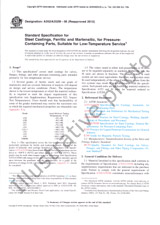We need your consent to use the individual data so that you can see information about your interests, among other things. Click "OK" to give your consent.
ASTM E633-21a
Standard Guide for Use of Thermocouples in Elevated-Temperature Mechanical Testing (Includes all amendments and changes 2/2/2022).
Translate name
STANDARD published on 1.11.2021
The information about the standard:
Designation standards: ASTM E633-21a
Publication date standards: 1.11.2021
SKU: NS-1049031
The number of pages: 8
Approximate weight : 24 g (0.05 lbs)
Country: American technical standard
Category: Technical standards ASTM
The category - similar standards:
Annotation of standard text ASTM E633-21a :
Keywords:
compensation, creep test, instrumentation, insulation, stress-rupture test, temperature, thermocouples, tolerance,, ICS Number Code 17.200.20 (Temperature-measuring instruments)
Additional information
| Significance and Use | ||||||||||||||||||||||
|
6.1 This guide presents techniques on the use of thermocouples and associated equipment for measuring temperature in elevated-temperature mechanical testing under typical conditions. Test durations range from minutes for tension, compression, Young's modulus, and superplastic property tests to thousands of hours for creep, stress-rupture, creep rupture, notch tension, and stress-relaxation tests. 6.2?Since elevated-temperature mechanical properties are highly sensitive to temperature, users should make every effort practicable to make accurate temperature measurements and provide stable control of the test temperature. The goal of this guide is to provide users with good pyrometric practice and techniques for precise temperature control for elevated-temperature mechanical testing. 6.3?Techniques are given in this guide for maintaining a stable temperature throughout the period of test. 6.4?If the techniques of this guide are followed, the difference between indicated temperature and true temperature, as used in Test Methods E21, E111, E139, E292, E328, E2448, and Practice E209 will be reduced to the lowest practical level. |
||||||||||||||||||||||
| 1. Scope | ||||||||||||||||||||||
|
1.1?This guide covers the use of ANSI thermocouple Types listed in Specification E230/E230M for elevated-temperature mechanical testing at temperatures typical in testing of metals. Note 1:?Typical conditions for mechanical testing are
specified temperatures up to 1800 ?F (982 ?C) in air at one
atmosphere of pressure.
1.1.1?This guide focuses on most commonly used base metal and noble metal ANSI type K, N, R, and S thermocouples. 1.1.2?Other ANSI thermocouple types that are listed in Specification E230/E230M may be used if the specific precautions and maximum temperatures for their use are followed. 1.1.3?It does not cover the use of sheathed thermocouples. 1.2?The values stated in inch-pound units are to be regarded as standard. The values given in parentheses are mathematical conversions to SI units that are provided for information only and are not considered standard. 1.3?This standard does not purport to address all of the safety concerns, if any, associated with its use. It is the responsibility of the user of this standard to establish appropriate safety, health, and environmental practices and determine the applicability of regulatory limitations prior to use. 1.4?This international standard was developed in accordance with internationally recognized principles on standardization established in the Decision on Principles for the Development of International Standards, Guides and Recommendations issued by the World Trade Organization Technical Barriers to Trade (TBT) Committee. |
||||||||||||||||||||||
| 2. Referenced Documents | ||||||||||||||||||||||
|



 Cookies
Cookies
